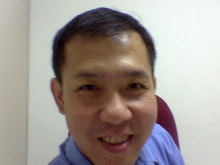Took an audio CD from Buddhist Maha Vihara last month. Listened to it many times and I was impressed with the whole talk. The talk entitled "Contentment as an Antidote for Depression" was presented by Dr. Pang Cheng Kar, a medical doctor from HKL with clinical experience in psychology and psychiatry. The good Doc articulated the concept of "what we think will determine how we feel".
This is very close to what The Buddha taught as stated in Dhammapada Chapter 1, Verse 1 & 2:
We are what we think. All that we are arises with our thoughts. With our thoughts we make the world. Speak or act with an impure mind, and trouble will follow you as the wheel follows the ox that draws the cart... Speak or act with a pure mind, and happiness will follow you as your shadow, unshakable.
Dr. Pang outlined 5 thought patterns that can make us depressed, based on the model by Dr. Aaron Beck, the father of cognitive therapy.
1. Generalization: exaggerate and over-amplified matters.
2. Catastrophic Thinking: projecting the worse of the future.
3. Dichotomous or Dualistic Thinking: think of everything in black and white, either success or failure, good or bad, intelligent or stupid etc. No shades, no in-betweens, no tolerance.
4. Personalization: finding faults constantly, with ourselves or others.
5. Absolute thinking: everything is a must. Extreme craving for certain results or outcomes.
All these 5 thought patterns have something in common: fault finding.
He then introduced some ways to cope or overcome depression by conditioning how we think, namely developing contentment. And this is beautiful: he suggest we keep a Diary or Book of Contentment for ourselves. Cultivate or develop contentment by jotting down all the wonderful things that happened to us. For me, this blog is my own diary of contentment.
There are 3 things we can write down in our Book of Contentment:
1. Be grateful for the things that didn't go wrong. Things we take for granted, for eg. our health, enough food to eat, a proper place to stay, peaceful country etc. Many others are suffering from poor health, lost of limbs or abilities, wars and deprived of basic human needs.
2. Be grateful for things that went right. Rejoice for all the good things that happened to you: a caring & supportive family, spouse, a good education, good career, thriving business and all the fine things you have been enjoying in life. Avoid craving for more by rejoicing in them continously as if they just happened yesterday. Dr. Pang shared how he is still thankful for the scholarship he received years ago.
3. Be grateful for things that went wrong. This is highest level of developing contentment. I guessed all of us are too eager to blame but forget to learn from our mistakes. It is the bitter events in our lives that offer us the opportunities to grow and mature into a wiser, better person. This is what Dr. Pang meant by "transformative suffering", learning from our hardship or our pains. By understanding and accepting the fact that our lives will always have ups and downs, we become more forgiving, tolerant and patient to ourselves and others, and in the process, become a happier person.
I dunno about you, but to me, Contentment equals Happiness.
PS. Clinical depression is different from the low mood or blues we sometimes feel. And do note that complacency, indifference or apathy is NOT contentment.
Subscribe to:
Post Comments (Atom)






No comments:
Post a Comment